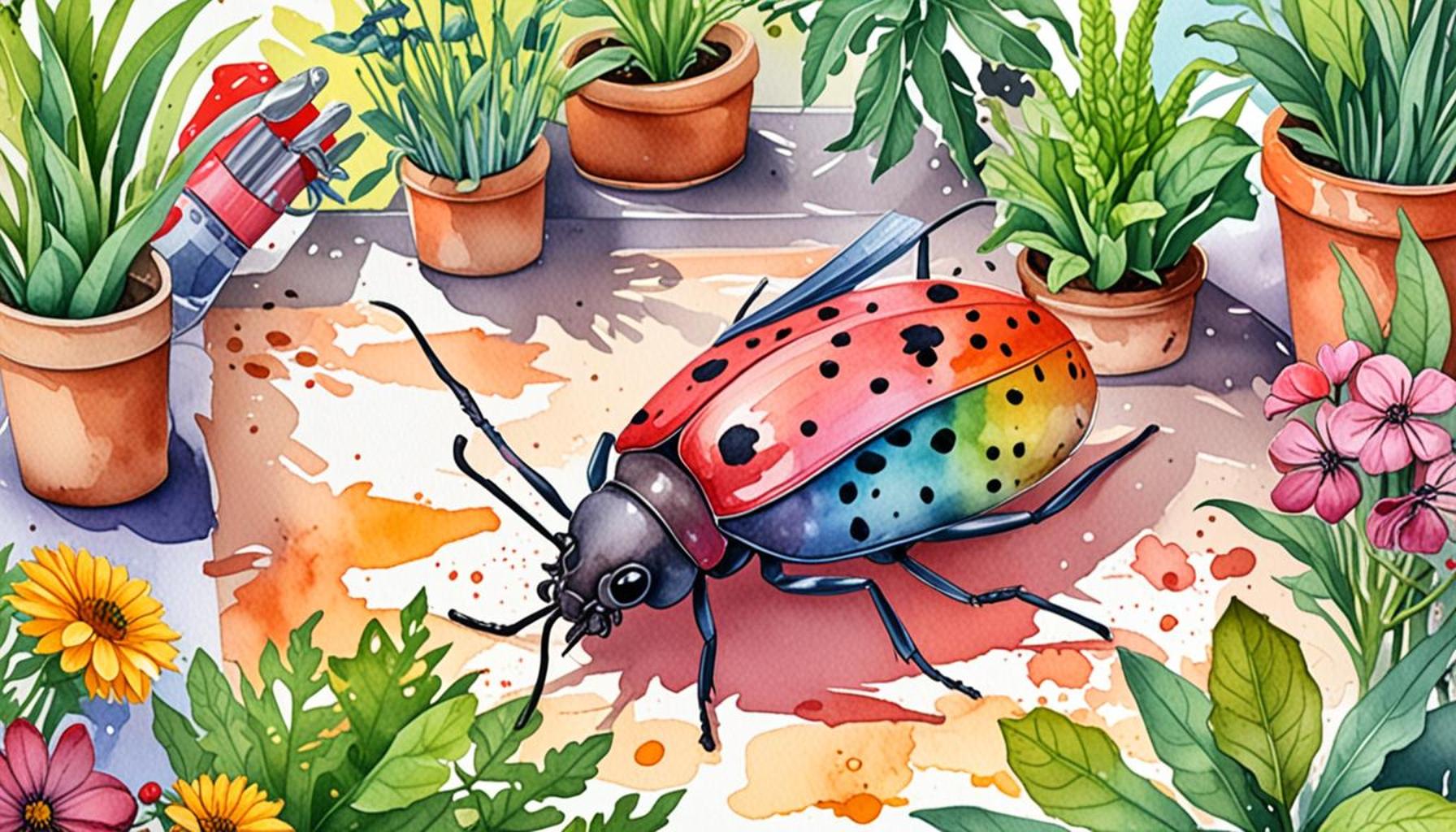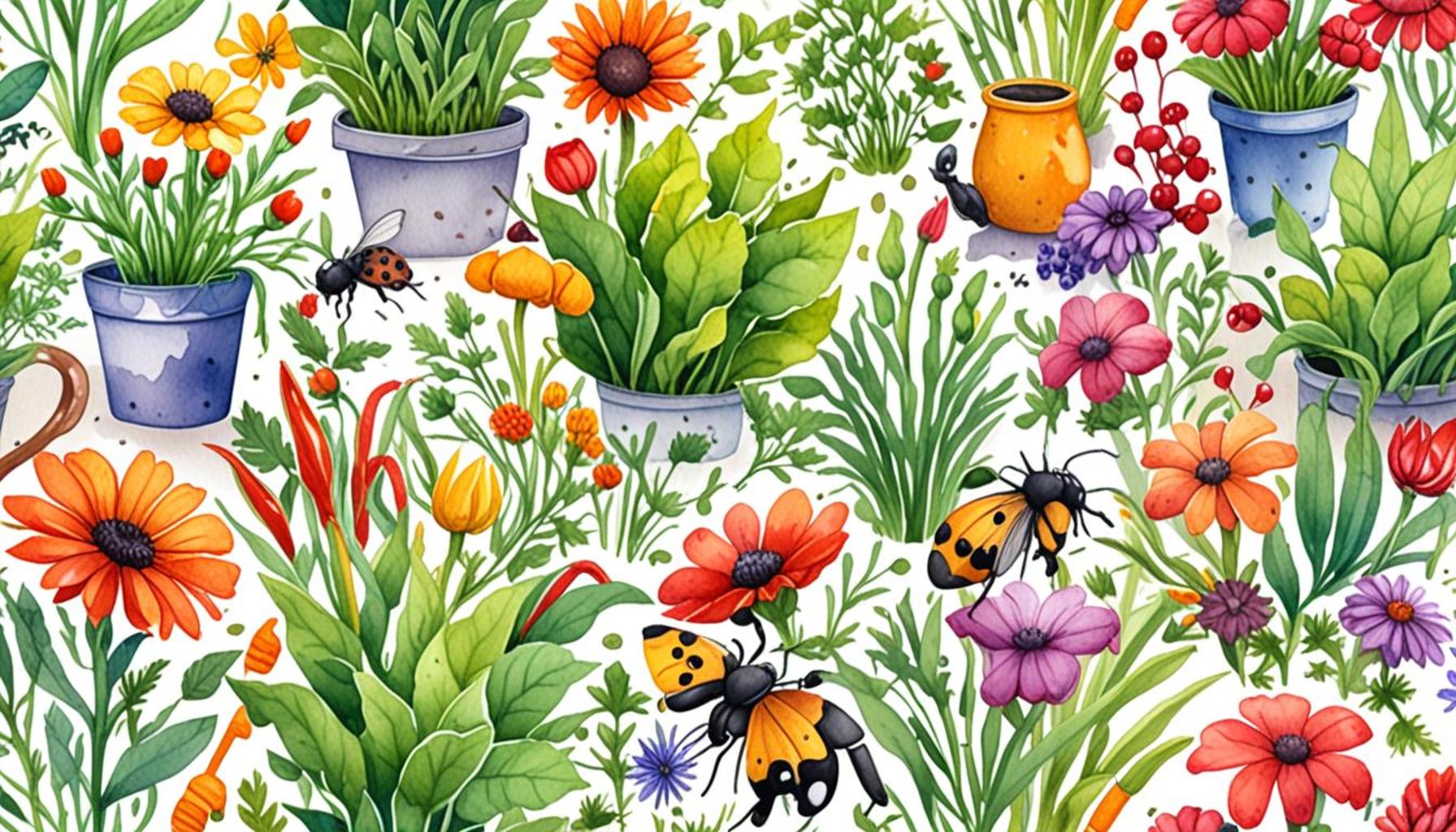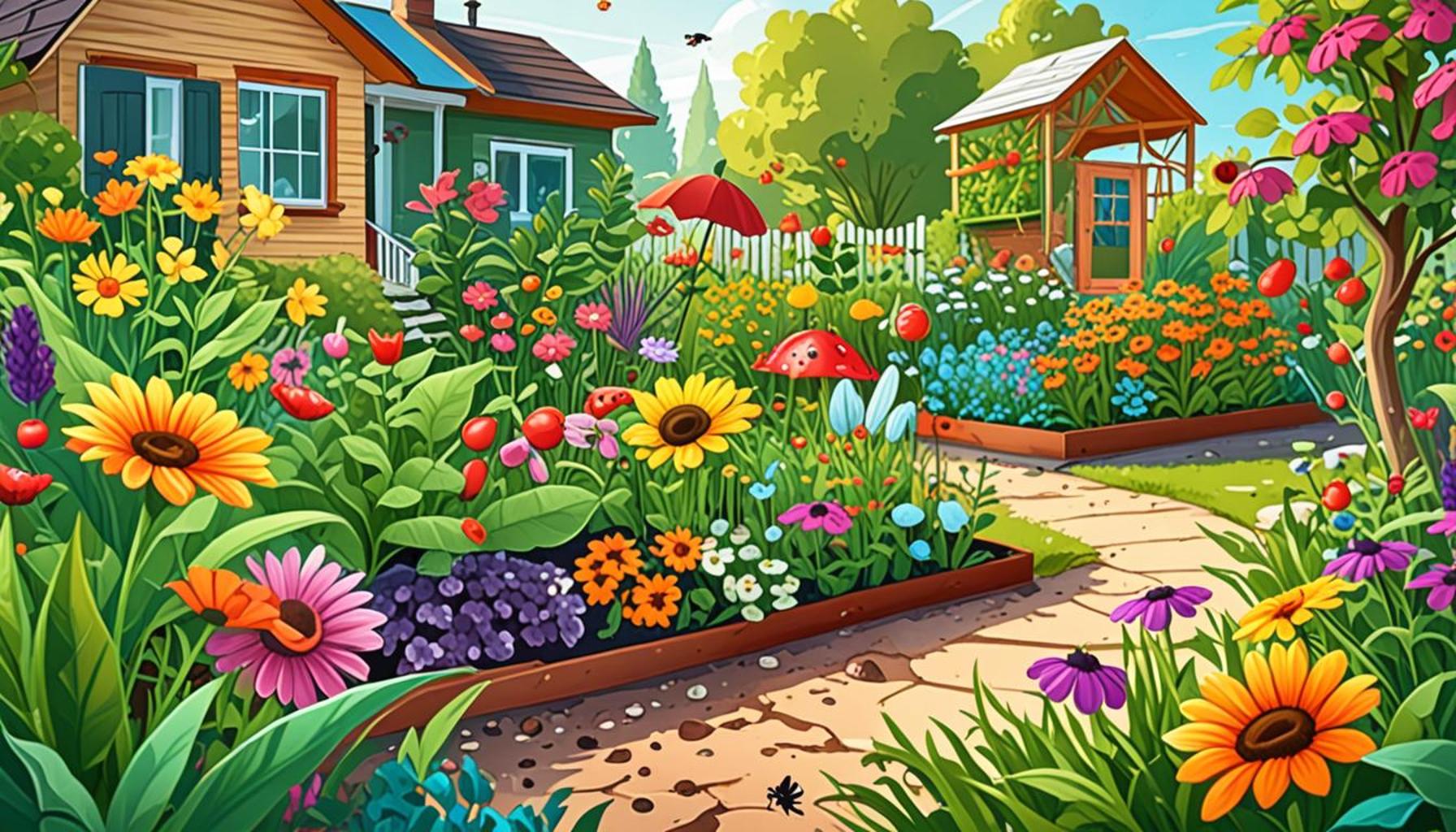Natural Pest Control Methods for Beginners in Home Gardening

Embracing Nature’s Helpers
Gardening is a fulfilling venture that extends far beyond the mere act of planting seeds; it encompasses nurturing an intricate ecosystem. For novice gardeners, the task of pest control can often feel overwhelming. Fortunately, by selecting natural pest control methods, you not only foster the health of your plants but also contribute positively to the environment.
Transitioning to natural alternatives comes with numerous advantages that cater not only to garden aesthetics but also to personal well-being and ecological safety. Consider the following benefits:
- Eco-Friendly: Using natural pest control methods drastically reduces the presence of harmful chemicals in your garden, promoting overall ecological balance.
- Safe for Children and Pets: These methods significantly minimize the risks associated with toxic substances, making the garden a safer place for children and pets who tend to explore.
- Healthy Produce: When you cultivate fruits and vegetables without synthetic pesticide residues, you enjoy the peace of mind that comes from consuming healthier and safer food options.
Implementing sustainable practices in home gardening can be both straightforward and fulfilling. Here are some effective natural pest control methods that you may consider incorporating into your gardening routine:
- Encourage Beneficial Insects: Insects like ladybugs and lacewings are nature’s little warriors, efficiently controlling aphid populations and other pest-related issues. Attract them by planting native flowers that provide nectar.
- Companion Planting: This method involves pairing certain plants that naturally repel pests. For instance, marigolds are known to deter nematodes, while basil can keep flies and mosquitoes at bay when planted alongside tomatoes.
- Organic Sprays: Homemade organic sprays made from ingredients like neem oil or garlic can effectively deter pests without harming beneficial insects. For example, a simple garlic spray can be concocted by blending garlic cloves with water, straining the mixture, and applying it to your plants.
As you explore the diverse world of natural pest control, you may uncover many techniques tailored specifically to your garden’s unique needs. By utilizing these methods, you not only protect your plants but also create a balanced ecosystem where all living creatures can thrive.
Are you prepared to delve deeper into these practices? The journey into organic gardening is not just about pest control; it’s an opportunity to reconnect with nature and foster a healthy, vibrant environment. Whether you’re an avid gardener or a beginner, there’s always more to learn and discover in the fascinating world of sustainable gardening.
DISCOVER MORE: Click here to learn about selective harvesting
Effective Techniques for Beginner Gardeners
Exploring natural pest control methods can transform your garden into a flourishing oasis while keeping unwanted pests at bay. For beginners, the key is to understand that controlling pests doesn’t always mean reaching for harsh chemicals. Instead, consider integrating simple yet effective techniques that work in harmony with nature. Here are several methods that you can easily implement in your home garden:
- Crop Rotation: This age-old practice involves changing the location of your crops each season. By rotating plants, you reduce the likelihood that pests will settle in your garden, as many insects are attracted to specific plants over time. For example, if you planted tomatoes in one area this year, consider planting beans or another unrelated crop in that same spot next year.
- Homemade Traps: Traps can be a straightforward way to manage pest populations. For instance, fermented fruit traps can attract fruit flies, while a simple bowl of soapy water can ensnare aphids. By placing these traps strategically around your garden, you can monitor and control pest levels without using any toxic substances.
- Natural Predators: Attracting birds, frogs, and other natural predators can provide a natural defense against pest species. Installing birdhouses or including a small water feature can entice birds, while planting a diverse range of flora creates a habitat that supports beneficial insects like spiders and predatory beetles.
- Diatomaceous Earth: This natural powder is made from fossilized aquatic organisms and can be sprinkled around plants. It works by dehydrating insects with exoskeletons, effectively deterring them from your garden. It’s a popular choice for many organic gardeners looking for a non-toxic pest control solution.
Along with these methods, it’s important for beginners to develop a keen observational eye. Regularly inspecting your plants allows you to spot early signs of pest activity, enabling you to intervene promptly. Familiarize yourself with common pests that threaten your garden, such as aphids, spider mites, and cabbage worms, and learn to identify their signatures, like holes in leaves or sticky residues.
Mulching is another technique that serves multiple purposes, including pest prevention. A thick layer of organic mulch not only helps retain soil moisture but also creates a barrier that deters pests from laying eggs in the soil. Additionally, mulching enriches the soil as it breaks down, providing nutrients for your plants.
Arming yourself with knowledge about these natural pest control methods can lead you towards successful gardening without resorting to synthetic pesticides. By cultivating a garden that thrives on ecological balance, you will not only protect your plants but also contribute to a healthier planet for future generations.
| Advantage | Description |
|---|---|
| Environmentally Friendly | Natural pest control methods mitigate harm to the ecosystem, ensuring safer gardening practices. |
| Cost-Effective | Utilizing everyday ingredients or plants as pest deterrents can significantly reduce gardening expenses. |
When delving into the world of natural pest control methods, beginners in home gardening will find that these practices not only benefit the garden but also contribute to a more sustainable environment. By adopting these environmentally friendly approaches, gardeners can effectively combat pests without resorting to harsh chemicals. This is essential for preserving the biodiversity of beneficial insects such as bees and ladybugs, which play vital roles in pollination and pest management.Cost-effectiveness is another impressive advantage of these methods. Many natural pest control solutions can be sourced from common household items or plants, making them accessible for anyone looking to save money. For instance, home remedies like garlic spray or neem oil can deter pests while maintaining the health of your garden’s ecosystem. Consequently, these methods not only protect your cherished plants but also promote a greener approach to gardening, allowing you to enjoy the process while making a positive impact on the environment. Exploring various natural methods can broaden your gardening expertise and deepen your connection to nature.
DIVE DEEPER: Click here to learn how to use companion plants effectively
Enhancing Your Garden’s Resilience
In addition to the pest control methods previously discussed, there are several other natural pest control strategies that can further enhance your home garden’s resilience. Understanding the intricate relationships between plants and their surrounding ecosystem allows you to create a thriving environment, reducing your reliance on chemical pesticides.
- Companion Planting: This technique involves planting different species of plants in close proximity for mutual benefit. Certain plants, such as marigolds, are known to repel harmful insects while attracting beneficial ones. For instance, planting marigolds alongside tomatoes can deter nematodes and aphids, while basil may repel flies and mosquitoes, boosting the health of your tomato crop.
- Essential Oils: Many essential oils are known for their pest-repelling properties. Popular choices include neem oil, which comes from the seeds of the neem tree, and peppermint oil, effective against ants and spiders. These oils can be diluted with water and applied to plants to deter pests without the use of synthetic chemicals.
- Handpicking: For smaller infestations, especially of larger pests like caterpillars or beetles, handpicking can be an effective solution. Regular garden walks allow you to spot these pests, and direct removal can significantly decrease their numbers. Dispose of them far from your garden to prevent them from returning.
- Beneficial Nematodes: These microscopic roundworms can be a game changer for pest control in the garden. They seek out harmful larvae in the soil and can diminish populations of pests like grubs and root weevils. Applying beneficial nematodes is a natural way to reduce pest pressure while supporting a healthy soil ecosystem.
Another essential practice for beginners is implementing an integrated pest management (IPM) approach. This methodology focuses on combining different strategies to control pest populations sustainably. IPM emphasizes understanding pest biology, monitoring pest levels, and using cultural controls before resorting to more direct methods like traps or essential oils. For instance, maintaining a diverse plant community can attract beneficial insects that act as natural predators, creating a balanced ecosystem within your garden.
Moreover, soil health plays a crucial role in your garden’s overall management of pests. Healthy soil produces resilient plants that can withstand pest infestations better than weak or stressed plants. Regularly adding organic matter through compost or well-rotted manure will enrich your garden soil and promote beneficial microbial activity. This, in turn, supports plant health and can enhance their ability to fend off pests.
Seasonal timing is also vital in your pest management strategy. Being aware of when certain pests are most active allows you to take preemptive measures. For instance, leafy greens and brassicas tend to attract aphids and caterpillars in the warmer months. Planting these crops early in the spring or late in the summer can often help you evade peak pest periods.
By incorporating these additional methods, you’ll find yourself well-equipped to handle pest challenges in your garden. Embracing these natural pest control methods can lead to a more enjoyable gardening experience, fostering a sense of connection to the cycle of nature and the joy of harvests free from synthetic interventions.
DISCOVER MORE: Click here to learn the best time to water your plants
Conclusion
In conclusion, embracing natural pest control methods is not only beneficial for your home garden but also for the environment at large. By understanding the principles of companion planting, utilizing essential oils, and engaging in direct methods like handpicking and introducing beneficial nematodes, you can create a pest-resistant ecosystem that thrives without the need for harsh chemicals. These strategies enrich your soil, improve plant health, and foster biodiversity, ultimately leading to a more productive and harmonious garden.
Moreover, implementing an integrated pest management (IPM) approach equips you with a dynamic toolkit to tackle pest populations effectively and sustainably. This holistic view and attention to seasonal changes in pest activity will enhance your gardening skills, making you a more attuned steward of your plot. As you experiment with these methods, each season offers new lessons and insights that will augment your gardening experience and deepen your appreciation for the natural world.
As you embark on your gardening journey, remember that every small step you take towards implementing these natural strategies contributes to a greater ecological balance. Whether you’re growing tomatoes in your backyard or cultivating herbs on a balcony, these pest control methods invite you to connect with nature on a deeper level, transforming your gardening venture into a rewarding and fulfilling experience. Dive into the endless possibilities of natural pest control and watch your garden flourish!


